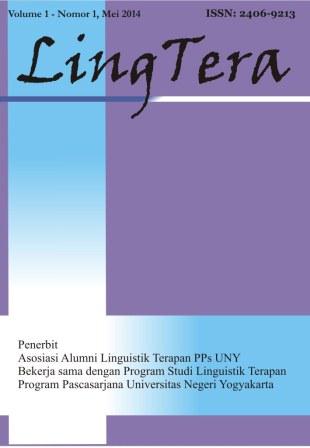Developing English teaching and learning materials for nursing students of Universitas "˜Aisyiyah Yogyakarta
DOI:
https://doi.org/10.21831/lt.v6i2.14924Keywords:
develop, learning materials, nursing students, unitsAbstract
The aim of this research and development study was to develop a set of English teaching and learning materials for nursing students. The development of the materials was carried out in three phases: planning, developing, and evaluating. The research findings revealed the nursing students' needs concerning media, language instruction, assignments, lecturer's and student's roles, setting of the class, learning activities, use of English for the students, students' intention to learn English, setting in which English was used, learning themes, input texts, students' English proficiency, target culture knowledge, appropriateness of the English book used, English skills the students want to improve, and layout of the materials. The means of materials were 3.95 in terms of the language teaching and 3.63 in terms of the content. The means of three units were 3.43, 3.44, and 3.33. The means implied that the developed materials were appropriate to be used in the teaching and learning process as the materials met the nursing students' needs and interest.
References
Aniroh, K. (2009). From English as a general school subject onto English as a medium for learning specific subjects: The need to shift in the teaching orientation. TEFLIN Journal, 20(2), 169–179. https://doi.org/http://dx.doi.org/10.15639/teflinjournal.v20i2/169-179
Bloor, M. (1998). English for specific purposes: The preservation of the species (some notes on a recently evolved species and on the contribution of John Swales to its preservation and protection). English for Specific Purposes, 17(1), 47–66. https://doi.org/10.1016/S0889-4906(97)00044-6
Borg, W. R., & Gall, M. D. (1983). Educational research: An introduction. Longman.
Brown, H. D., & Lee, H. (1994). Teaching by principles: An interactive approach to language pedagogy. Prentice Hall Regents Englewood Cliffs, NJ.
Burns, A. (2009). Doing action research in english language teaching: A guide for practitioners. Routledge. https://doi.org/10.4324/9780203863466
Edwards, M. L., & Smith, B. C. (2016). The effects of the neutral response option on the extremeness of participant responses. Journal of Undergraduate Scholarship, Longwood University, 6(63), 7–8. https://doi.org/10.1017/CBO9781107415324.004
Gall, M. D., Gall, J. P., Borg, W. R. D., & Gall, J. P. (2003). Educational research: An introduction (7th ed.). Pearson Education Inc.
Hadijah, D. (2010). An analysis of materials and students'needs in learning English: A case study at an Institute of Higher Education of Economics in Bandung. Universitas Pendidikan Indonesia.
Kosasih, F. R. (2017). English materials and their relevance to the needs of pharmacy students (A case study at a school of pharmacy in Bandung - Indonesia). Asian EFL Journal, 2017(97), 4–27.
Miles, M. B., Huberman, A. M., & Saldaña, J. (2014). Qualitative data analysis: A methods sourcebook. Sage.
Nunan, D. (2004). Task-based language teaching. Cambridge University Press. https://doi.org/10.1017/cbo9780511667336
Richards, J. C. (2001). Curriculum development in language teaching. Cambridge University Press. https://doi.org/10.1017/cbo9780511667220
Tomlinson, B. (2008). English language learning materials: A critical review. Bloomsbury Publishing.
Tomlinson, B. (2011). Materials development in language teaching. Cambridge University Press.
Widoyoko, E. P. (2012). Teknik penyusunan instrumen penelitian. Pustaka Pelajar.
Downloads
Published
How to Cite
Issue
Section
Citation Check
License
LingTera allows readers to read, download, copy, distribute, print, search, or link to its articles' full texts and allows readers to use them for any other lawful purpose. The journal allows the author(s) to hold the copyright without restrictions. Finally, the journal allows the author(s) to retain publishing rights without restrictions.
- Authors are allowed to archive their submitted articles in an open-access repository.
- Authors are allowed to archive the final published article in an open-access repository with an acknowledgment of its initial publication in this journal.

Psychology, Evaluation, and Technology in Educational Research is licensed under a Creative Commons Attribution-ShareAlike 4.0 International License.
Based on a work at https://petier.org/index.php/PETIER.










